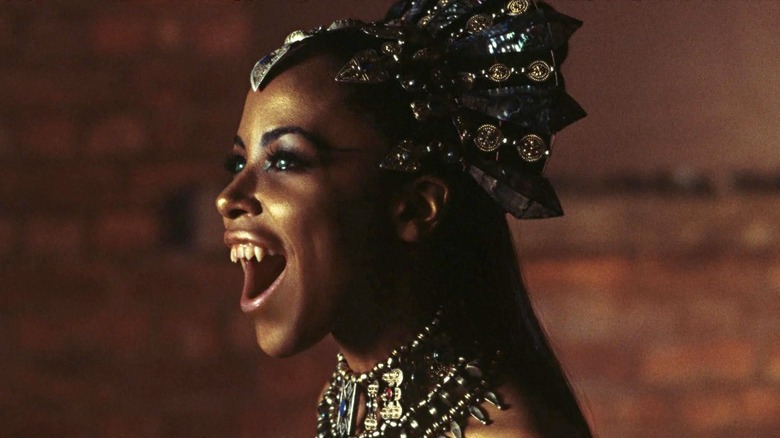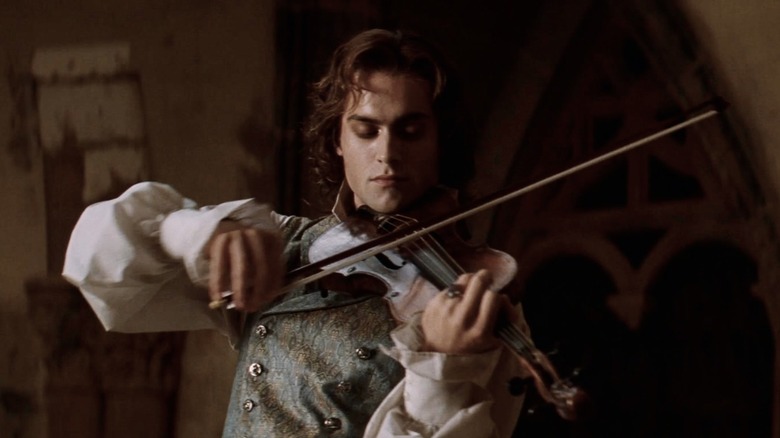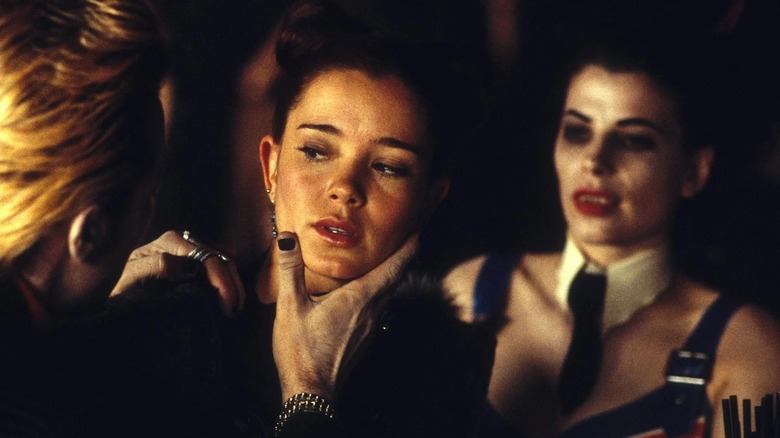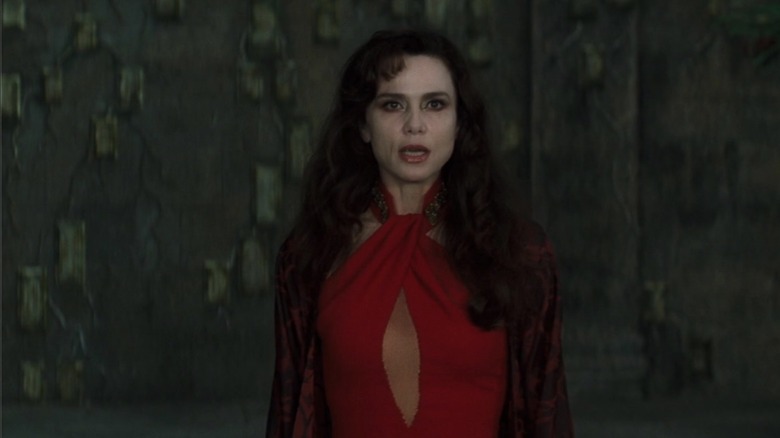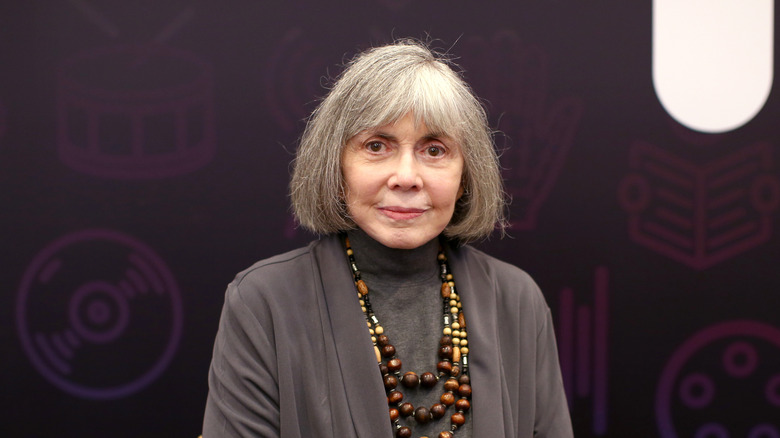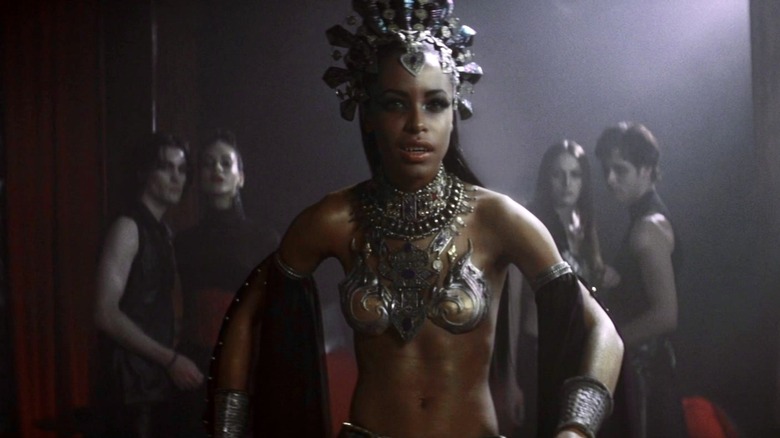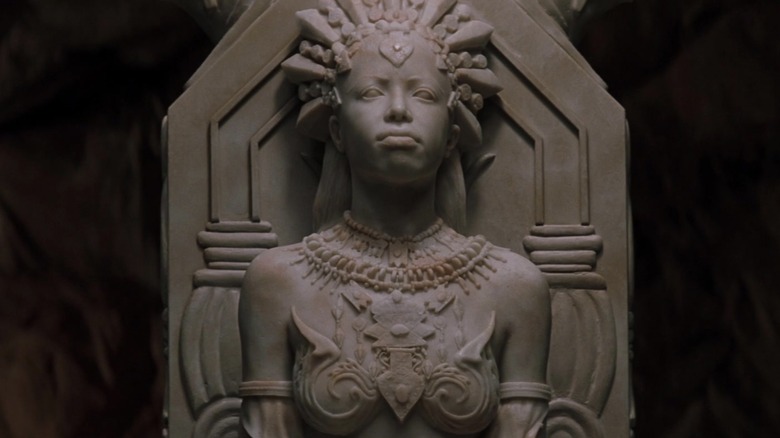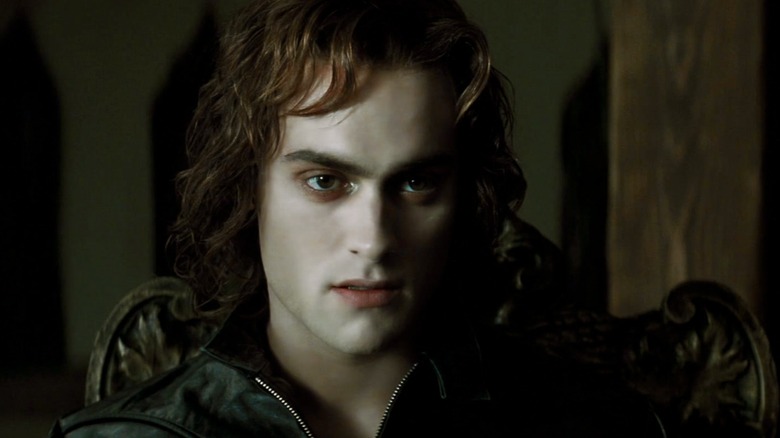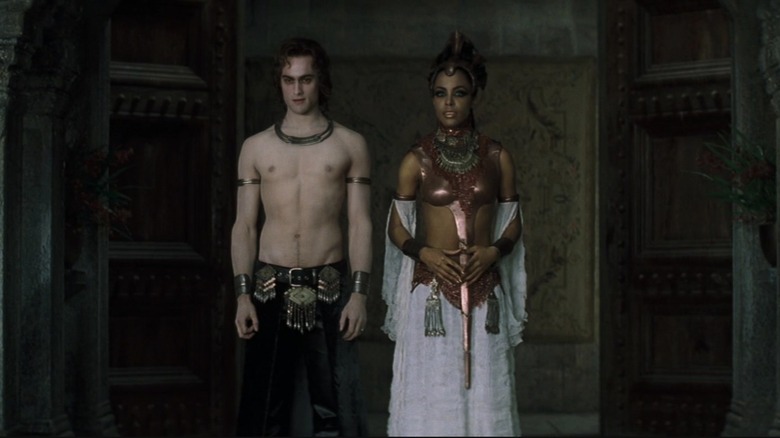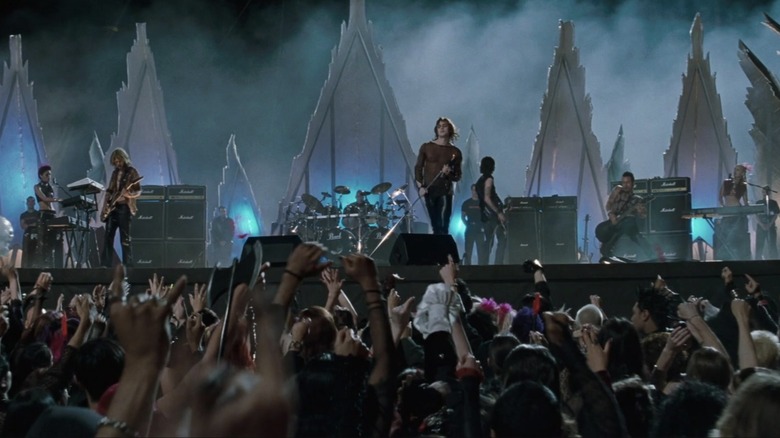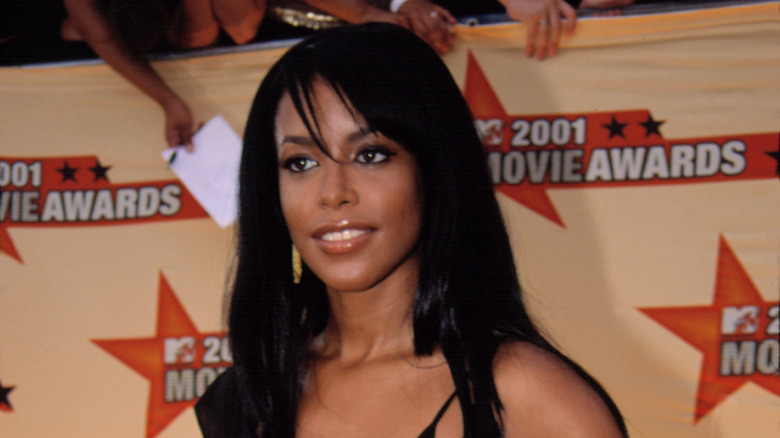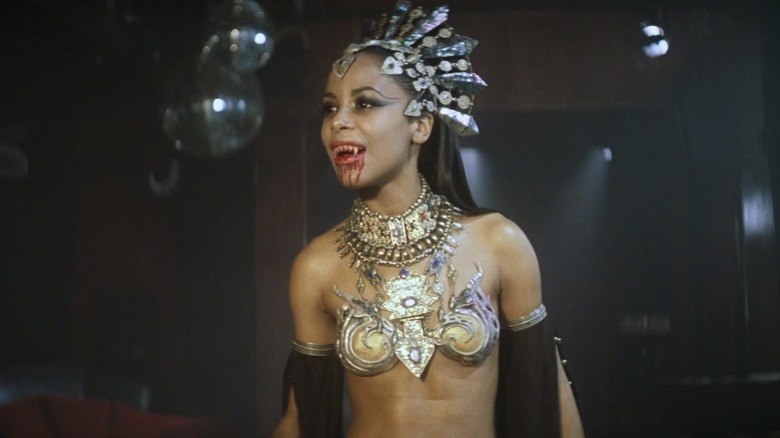The Untold Truth Of Queen Of The Damned
In "Queen of the Damned," the vampire Lestat (Stuart Townsend) awakens from a decades-long slumber to the sounds of nü-metal. Feeling inspired by this music, Lestat introduces himself and joins the band as their new lead singer. They name themselves The Vampire Lestat and become famous rock stars before promoting a massive concert in Death Valley. Lestat openly proclaims himself a vampire to the world, taunting vampires everywhere, "Come out, come out, wherever you are."
Although most assume The Vampire Lestat is nothing but a publicity gimmick, Jesse Reeves (Marguerite Moreau) with the Order of Talamasca, a secret society dedicated to paranormal studies, believes Lestat is a vampire, who is revealing their secrets in the lyrics of his enigmatic songs. Jesse travels to Los Angeles, setting herself on a collision course with these creatures of the night. After Lestat's music awakens Queen Akasha (Aaliyah), the ancient mother of vampires, she wants Lestat as her consort, ruling over humans and vampires alike. Lestat must choose between the power she offers him and the world as he knows it.
Critics ridiculed this flawed film upon its release, but it has since built a cult following because of its goth sensibilities, the incredible soundtrack, and the tragic death of its titular star. A myriad of issues beleaguered the film, with challenges starting in development, and carrying through to the delayed release of the film in 2002. Join us as we uncover the untold truth of "Queen of the Damned."
Queen of the Damned had a long and troubled road to the screen
This troubled journey to release "Queen of the Damned" began when Warner Bros. passed on adapting the second book in Anne Rice's "Vampire Chronicles" series, "The Vampire Lestat," when director Neil Jordan who made the critically and commercially successful "Interview with the Vampire," could not produce an acceptable script for the follow-up. This isn't a criticism of Jordan's talents. Many, including Rice and Jorge Saralegui (who worked as a producer on the film), believed that the second book in the series would lend itself better to a miniseries than a two-hour movie.
Warner Bros. jumped directly to the third book in the "Vampire Chronicles" series, believing it had a more exciting storyline that would adapt better to the screen. But, there was a problem — the storyline of the third novel wouldn't make sense without exploring Lestat's origin story. Alas, the studio made the controversial choice to loosely base their "Queen of the Damned" adaptation on elements from books two and three in Rice's wildly successful trilogy.
Michael Rymer was hired after expressing an interest in making an adaptation of "The Vampire Lestat." He was convinced to direct "Queen of the Damned," pitched as an adaptation of the two novels. Rymer told Vulture he had concerns about this approach, asking the studio, "How can you do the third book if you haven't done the second?" They hired screenwriter Scott Abbott after he pitched an adaptation focusing on the rock star Lestat, and his love triangle between Akasha and Jesse Reeves.
Development and production were rushed because of a deadline
Jorge Saralegui, who produced "Queen of the Damned" for Warner Bros., wrote, "As with many aspects of the film business, the fact that there was a deadline moved it to the front burner... but that happens all the time. Believe me, there was no big rush or sense of panic on their part to get the film made. It was more like, it's now or never, so let's see what we can do." Although the studio may have not felt rushed, some who were unhappy with the final results of their efforts chalked the flawed movie up as a rushed job.
According to Den of Geek, Warner Bros. purchased the rights to the first three "Vampire Chronicles" books in 1990 and had a decade to produce films based on the novels. In 2000, the rights would revert to the author Anne Rice if the studio didn't start production during the calendar year. Although "Interview with the Vampire" came out in 1994, Warner Bros. didn't begin filming "Queen of the Damned" until October of 2000 (via Vulture).
Entire storylines and characters from the books were removed from the script
Major characters and storylines were removed from "Queen of the Damned" because they were so involved they could have been their own movies. As many involved in the project have since said, these novels are better suited to sprawling miniseries rather than the constraints of a theatrical release. Because of the involved storylines, many characters, and large swaths of time covered in Anne Rice's "Vampire Chronicles" series, large portions of each book were condensed and cut from the film.
Specifically, the ancient vampire twins storyline from when Akasha sat on her throne was removed, leaving Maharet (Lena Olin) without her sister Mekare, erasing their significance to Akasha's demise. Lestat's maker is also changed from Magnus to Marius. The history and importance of the Order of Talamasca have been omitted from the film, leaving us with Jesse's loose associations with the order and her invented-for-the-screen love triangle with Lestat and Akasha (per Den of Geek).
Considering how Warner Bros. was concerned that the events in "Interview with the Vampire" and "The Vampire Lestat" contradicted each other because they are told from different points of view it seems strange they played so loose with other important characters and storylines in their adaptation. Fans, even as dedicated as Rice's, can make or break a film — the author suggested as much to Vulture when she said, "The result disappointed the vast majority of the book's fans and failed to turn them into the kind of self-motivated publicity force you need."
Anne Rice did not write the screenplay
"Queen of the Damned" was loosely based on Anne Rice's second and third book in her "Vampire Chronicles" trilogy. Although Rice wrote the screenplay for "Interview with the Vampire," the studio did not tap her to pen the script for "Queen of the Damned." As reported by the BBC, Rice offered to write the screenplay for free. When the studio declined her generous offer, Rice's relationship with the studio and the film adaptation became strained.
Scott Abbott, who wrote the screenplay, told Vulture, "Anne Rice wasn't involved at all with the writing process. I was very aware that I was combining two of her books and turning them into something that they weren't. I did feel trepidatious about that on a personal level, but adaptation often demands that." As reported by The Age, Rice wasn't happy with the first draft of the script and she shared this opinion with her fans via her website.
Director Michael Rymer told Vulture, "I apologized to Anne Rice when I went to send a cut of the film to her. I said, 'I don't think I've got your book on film at all.' She was a bit shell-shocked by how many changes we'd made to the story." When asked what she thought about "Queen of the Damned," Rice said in a candid interview, "Well ... I didn't care for the movie of 'The Queen of the Damned' at all. I begged the studio to not make that movie. I told them the readers did not want that movie. What they wanted was a movie based on 'The Vampire Lestat.' And the studio went on and made the movie, and the movie was not really based on my work. They used the names of the characters, but they replaced original material with material they had written for them by a scriptwriter. The movie was a great disappointment to most of my readers."
Akasha was the first character cast
The role of Akasha went to Aaliyah. Although the studio put together a list of prospective actresses including Halle Berry and Regina King, and the director even met with Cher, Warner Bros. never seriously considered another actress for the role (per Vulture). Aaliyah was filming "Romeo Must Die" in Vancouver, and director Michael Rymer flew up there to meet with her because the studio was very excited about her burgeoning acting career.
Rymer told Vulture, "I put that poor girl through the wringer. I got her to learn a monologue from Oscar Wilde's 'Salomé' and then I had her separately working on Egyptian accents. By the end of the process, I had her reciting Oscar Wilde in a very exaggerated Egyptian accent, crawling around on her knees like a calf." Despite the poor reviews and commercial response to "Queen of the Damned," no one involved in the movie was unhappy with Aaliyah's performance. Saralegui told Vulture, "Aaliyah's the best thing in the movie, and she's also the reason why probably almost anybody's gonna see it now."
Aaliyah herself had an intriguing connection with the story. In an on-set interview, the singer-actress said, "I think everybody has a bit of a fascination with the dark side," and in another interview about "Queen of the Damned," she expressed her excitement over being a part of a story about vampires and her admiration for Anne Rice. Aaliyah embraced the role, bringing her sensuality and natural presence to Akasha. As a result of her enthusiasm and commitment to the role, Aaliyah embodied the grace, power, and violence of the vampire queen, making her both seductive and frightening, dangerous and sexy — thus encapsulating the fundamental appeal of vampires.
Some Anne Rice fans were not happy with Akasha's casting, though
Some Anne Rice fans were not happy Akasha would be played by a woman of color because Rice described Akasha as "white as marble" in the novel. Rymer told Vulture, "We were dealing with a fairly hostile environment from the fan base: 'I can't believe Akasha is going to be Black. I can't believe Lestat isn't blond. This movie is going to suck.'"
Warner Bros. had good reasons for casting Aaliyah as Akasha, though. Taking history, geography, and representation into account, director Michael Rymer told Vulture, "I just had a very strong belief that if we were going to do African queens, we had to have a person of color" in the role of Akasha. While some accused the novel's fans of racism, many fans considered themselves purists regarding adaptations of the novels. They also weren't happy Lestat wasn't blond and similarly disapproved (alongside Rice herself) when Tom Cruise was cast as Lestat in "Interview with the Vampire." It remains to be seen whether a new rash of these criticisms will follow the forthcoming debut of AMC's "Interview with the Vampire" series.
Of the decision, Rymer told Vibe, "There were two factors for casting Aaliyah. I was very keen that Akasha, an Egyptian queen, not look like Elizabeth Taylor. And not only did [Aaliyah] do a good job on 'Romeo Must Die,' but people went to see her. This is a really difficult role, and she took on a huge challenge." Despite some initial reservations, almost everyone, including the author, agrees Aaliyah was captivating as Queen Akasha.
They considered many actors for the part of Lestat
Although Tom Cruise was offered the role of Lestat, he passed on the project (per Jorge Saralegui). As reported by Vulture, initially the studio was interested in casting Wes Bentley from "American Beauty" as Lestat, but he, too, passed on the role. The studio then met with several actors, including Ryan Reynolds and Heath Ledger, before turning their attention to Stuart Townsend.
Director Michael Rymer told Vulture, "I'd gone to see Stuart Townsend in 'Orpheus Descending' with Helen Mirren, and he was just riveting. And more importantly, he had this effect on women. It was quite palpable. That's something you can't really manufacture." Considering the central storyline of "Queen of the Damned," revolves around a love triangle, Lestat's magnetism was essential not only to the character but to this specific story.
Lestat needed to be a sexy, goth-glam rock star for this film, and Townsend slipped into the role effortlessly. Richard Gibbs, who co-wrote the music for the film, told Vulture, "He had all the rock-star moves down" for the concert scene. Even Anne Rice approved of casting Stewart Townsend as Lestat. On her website, Rice said, "I met Stuart Townsend, the young man who is playing Lestat and he was absolutely charming. He had Lestat's excellent speaking voice and his feline grace. I cannot wait to see him in the film."
Some felt Queen of the Damned erased Lestat's bisexuality
"Interview with the Vampire" reveled in the homoerotic undertones of Lestat (Tom Cruise) and Louis's (Brad Pitt) complex relationship, but some felt "Queen of the Damned" erased Lestat's bisexuality. Tony Sokol with Den of Geek, certainly agreed with that criticism, writing, "The film rolled back the nonchalant sexual fluidity Lestat de Lioncourt, enjoys on the page by neutering all scenes with male lovers," while also acknowledging Lestat's lover Nikki was eliminated from the film.
Christopher Rice, Anne Rice's son told Vulture, "Lestat, one of the most popular bisexual heroes of popular fiction, was given a romantic relationship with a female character [Jesse Reeves] with whom he barely interacts in the novel, and all suggestions of his past male lovers were erased." Screenwriter Scott Abbott didn't recall discussing Lestat's bisexuality. Director Michael Rymer told Vulture, "I felt like the relationship between him and Marius (Vincent Perez) was quite sexy. I always wanted more of that material, but it was tricky."
In an interview with The Free Library, Townsend said, "I never thought of this character as male or female, gay or nongay, just as a seducer and as someone who craves to be known, to be famous. I prepared by reading the Anne Rice novels and watching lots of vampire movies, but also by watching lots of rock performances and learning how they moved, especially Bowie." While Townsend's Lestat embodies glam-rock androgyny, some fans felt cheated because Lestat only engages romantically with women in the Warner Bros. adaptation.
Queen of the Damned was shot in Australia
The film was primarily shot in Australia, where the director Michael Rymer lives, with additional scenes shot in Los Angeles (per Vulture). They also shot the Death Valley concert in Australia. Rymer told Vulture, "We put out a casting call and got real goths to show up looking fantastic for Lestat's climactic concert scene. It was treated as a fairly big mainstream event: 'Come be in a real Hollywood movie.' These kids just went crazy. We were in a quarry 20 kilometers from Melbourne. I think we had about 5,000. It was fantastic."
Filming in Australia was becoming a popular choice for Hollywood studios in the late '90s and early'00s. "Dark City," the "Matrix" franchise, and "Moulin Rouge" were filmed in Australia to cut costs. Productions choosing to film in Australia have only become more popular in the 21st century because of the tax incentives studios can qualify for if they shoot in Australia and New Zealand.
Korn frontman Jonathan Davis provided Lestat's vocals for the movie
Jonathan Davis from Korn and Richard Gibbs, who played keys for Oingo Boingo before becoming a composer, teamed up to write the original music for "Queen of the Damned." Davis told Vulture, "They wanted the songs before they even cast the movie. Whatever we came up with for the vibe of the music was going to set the tone for the whole ... movie." Gibbs explained how they told the studio, "We don't want to just write the songs. We want to write the score."
As reported by Louder Sound, Gibbs toured with Korn for a month. Together, they wrote songs each night. During production, Gibbs rehearsed with the actors playing the band and Stewart Townsend, and Gibbs became worried because Townsend was uncooperative. As Gibbs told Louder Sound, during shooting his concerns proved unnecessary, saying, "He knew the songs inside out, he had clearly been rehearsing, and he looked like somewhere between Mick Jagger and Tina Turner and David Bowie, doing all the traditional rock'n'roll moves, and just blew us all away."
Louder Sound reported, because of his contract with Sony, Davis couldn't be featured on the soundtrack, only in the film, so other popular musicians lent their voices to the songs on the album. During filming, Aaliyah approached Gibbs about writing a song for her. Gibbs told Vulture after talking with Warner Bros. music department, they said, "That'll be the end-credits song. That's gonna be amazing." Sadly, Gibbs and Davis never got to write the song for Aaliyah.
Aaliyah died in a plane crash after she finished filming Queen of the Damned
After wrapping her scenes for "Queen of the Damned," Aaliyah's third album was released, and she began promoting her album and filming music videos. On August 25, 2001, after filming a music video for her song "Rock the Boat" in the Bahamas, Aaliyah and seven other people from the shoot boarded a Cessna 402B, which crashed minutes after takeoff. Everyone on board, including the pilot, died (per Rolling Stone). As reported by the BBC, Aaliyah's family sued Virgin Records America over the plane crash.
Aaliyah's death was devastating for her family, friends, fans, and the crew who had worked with her on "Queen of the Damned." Director Michael Rymer told Entertainment Tonight, "It took us all a long time to recover. We were editing the film and trying to cope with that loss. And feeling so terrible for her family." Aaliyah's brother, Rashad, provided vocals to clean up dialogue in the film that was unclear because of her Ancient Egyptian accent.
After her death, Warner Bros. delayed the release of the film because they didn't want it to appear they were trying to capitalize on her death (per The Age). Despite the studio's choices, Aaliyah's death will always be linked with "Queen of the Damned." It is a flawed film, but it showcased Aaliyah's talent and promise. Townsend told Entertainment Tonight, that Aaliyah "was very chameleon-like, and she knew that, and I think she would have just continued to surprise us."
A Scottish man who committed murder claimed Akasha told him to do it
In Scotland, Allan Menzies claimed during his murder trial that the character Akasha from "Queen of the Damned" told him they would reward him in his next life as an immortal vampire if he committed murder. Menzies was arrested for killing his lifelong friend, Thomas McKendrick. He also admitted to watching "Queen of the Damned" over 100 times before the murder (per BBC).
As reported by The Scotsman, during testimony, Menzies admitted to drinking his victim's blood and attempting to die by suicide after committing the murder, wanting to get to his next life quicker. Dr. Derek Chiswick, a forensic psychiatrist, diagnosed Menzies with a personality disorder, but Dr. Chiswick said Menzies' fantasies may have been "manufactured to avoid conviction" rather than being delusions from mental illness.
In 2003, Menzies was convicted and sentenced to life. According to The Independent, judge Roderick MacDonald told Menzies, "Three psychologists have diagnosed you as a psychopath. In my opinion, you are an evil, violent and highly dangerous man who is not fit to be at liberty." Menzies' solicitor, Aamar Anwar, believed Menzies was suffering from paranoid schizophrenia, and one psychiatrist supported this diagnosis.
In 2004, The Guardian reported Menzies was found dead in his cell after serving a little over a year of his life sentence. Although no details were released, they believed he died by suicide. Menzies' obsession with Akasha and the film "Queen of the Damned" was a morbid twist to a very disturbing crime.
If you or anyone you know is having suicidal thoughts, please call the National Suicide Prevention Lifeline at 1-800-273-TALK (8255).
If you or someone you know is struggling with mental health, please contact the Crisis Text Line by texting HOME to 741741, call the National Alliance on Mental Illness helpline at 1-800-950-NAMI (6264), or visit the National Institute of Mental Health website.
